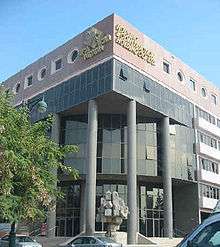Solel Boneh
 | |
| Public company | |
| Industry | Construction, Civil engineering, Infrastructure, Roads and Logistics planning |
| Founded | 1921 |
| Founder | The Histadrut |
| Headquarters | Israel |
Key people |
Yehoshua Rapaport (CEO) Uri Shani (head of directors) |
| Revenue | 1.7 billion USD in 2004 |
| Owner | Housing & Construction Holding Company Limited |
| Website | www.solbo.co.il |
Solel Boneh (Hebrew: סולל בונה, lit. Paving and Building) is the oldest, and one of the largest, construction and civil engineering companies in Israel.
History
Solel Boneh was founded in 1921 during the first conference of the General Histadrut, under the name of Batz (Hebrew: בע"ץ), an acronym of Binyan veAvodot Tziburiot (Hebrew: בניין ועבודות ציבוריות, lit. Construction and Public Works). Its first project was to pave a road from Tiberias to Tzemah, which is now part of Highway 90. The company was founded as a cooperative organization in the spirit of socialist workers' groups, but it encountered financial difficulties, which led in 1923 to the founding of a company named "Solel Boneh," based on the organization but managed as a business corporation.
Solel Boneh had an integral role first in building activities in Mandate Palestine and later in Israel after statehood was achieved in 1948. Among other projects, the company built Tegart's wall in 1938. During the Mandate era it built bridges, airfields, bases for the British Army[1] and army projects in Iraq, Egypt, Bahrain and Cyprus.
In 1926, Solel Boneh employed 3,000 workers in various public works projects, included 139 women who worked in construction.[2]
Solel Boneh helped strengthen the Israel Defense Forces during the 1948 Arab-Israeli War, and it built strongholds and systems to supply water, in practice becoming the basis of the first logistics unit in the IDF.
In 1961, shares of Solel Boneh were first traded on the Tel Aviv Stock Exchange.
Israeli firms, such as Solel Boneh, were often involved in building projects in Africa during the 1960s and 1970s. One reason Operation Entebbe in 1976 was so well-planned was that the building in which the hostages were being held had been built by Solel Boneh, which still had the blueprints, and supplied them to the government of Israel.
During the years 1960-69, Solel Boneh carried out the construction of the Basilica of the Annunciation in Nazareth.

In 1984, a subsidiary, Solel Boneh Building and Infrastructure, was founded under full control of the parent company. In 1989, control of Solel Boneh was passed on to the Housing & Construction Holding Company Limited (Shikun U'Binui). In 1996, control of that holding company, including Solel Boneh, was obtained by Ted Arison and later to his daughter, Shari Arison, after his death in 1999.
See also
References
- Encyclopedia Judaica vol. 15 columns 92-93.